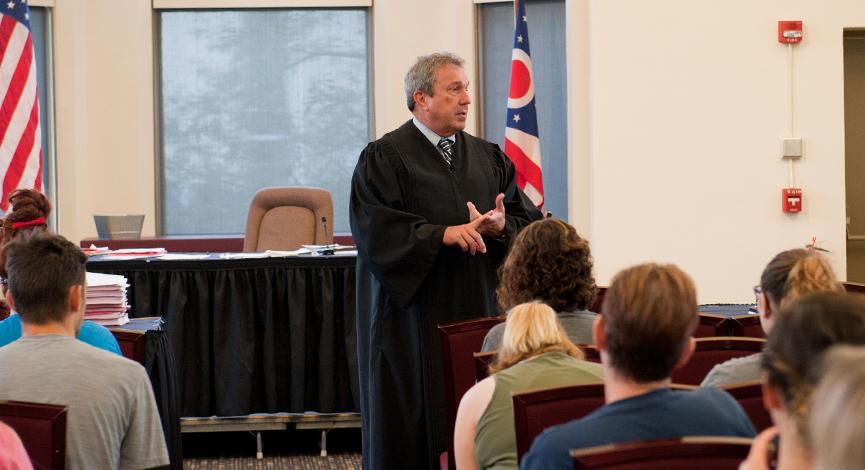
Seneca County Common Pleas Judge Steve Shuff brought his courtroom to Heidelberg’s campus today in celebration of Constitution Day. In all, Shuff dealt with 15 felony criminal cases in Herbster Chapel.
Students, faculty and staff got to witness the real-life court cases, followed by enlightening interaction between cases with the judge, who emphasized the importance of Constitutional rights in the judicial process.
The first defendant, a 24-year-old man, changed his plea from not guilty to guilty to four charges of attempted grand theft, safe cracking, possession of criminal tools and bringing drugs onto the grounds of a governmental facility. Shuff sentenced him to a total of 30 months in prison – but not before he asked the defendant about his drug of choice. “Marijuana, methamphetamine,” he replied.
“If not for that, would you be here today?” Shuff asked. The answer: “Absolutely not.”
Through the proceeding, Shuff reminded the defendant of the Constitutional rights he would be giving up if he chose to plead guilty: the right to a jury trial, the right to confront witnesses, the right to have witnesses subpoenaed on his behalf, the right to testify in his own defense at trial, the requirement for the state to prove his guilt beyond a reasonable doubt and his Second Amendment right to own or control any firearms, possibly for the rest of his life.
Between cases, Shuff answered questions from students – and sometimes quizzed them – about the judicial system: how arraignments work, the different degrees of felonies, trying juveniles as adults, the nature of competency hearings, bond issues.
Following the second hearing – a young woman who changed her plea to guilty on a charge of possession of cocaine – he asked the defendant the same question about the first drug she ever tried, also marijuana. His point: marijuana is the gateway drug for many addicts who eventually show up in his courtroom.
“About 90 percent of the cases I see, the gateway drug is marijuana, and then (their drug use) goes up from there,” he said, estimating that about 70-80 percent of the cases he sees are drug-related.
“If I didn’t have drug or drug-influenced cases, I might not have a job, and you know what? I’d be OK with that,” Shuff said.
He had a strong message for the students. “We have a huge issue with opioids here. We’re losing an entire generation.”
“The first time you use heroin, you are hooked – 100 percent. Heroin is so powerful. If you see it, run the other way.”